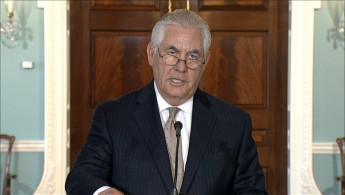Trump and Tillerson play good cop, bad cop over Qatar's alleged 'terror funding'
US President Donald Trump and Secretary of State Rex Tillerson made conflicting statements on Friday about allegations of Qatar funding "terrorist groups".
Trump accused Doha of funding such groups at a "very high level" as Gulf states - led by Saudi Arabia and the UAE - launch a media and diplomatic war on Qatar.
"The nation of Qatar has unfortunately been a funder of terrorism, and at a very high level", Trump said during an appearance alongside Romania's president at the White House.
Trump, whose accusation was accompanied by a call for Qatar to re-join "the unity of responsible nations", contrasted with more balanced remarks by Tillerson, who urged calm as Doha remains blockaded by neighbouring states.
The secretary of state urged Gulf nations, including Saudi Arabia, who have imposed a diplomatic blockade on Qatar to go easy on their fellow GCC member.
"There are humanitarian consequences to this blockade," Tillerson urged.
He also contrasted the accusations from Gulf states and the president with Doha's role in the fight against the Islamic State group with the embargo potentially endangering the fight against the jihadi group.
"The blockade is also impairing US and other international business activities in the region and has created a hardship on the people of Qatar and the peoples whose livelihoods depend on commerce with [Doha]," he said.
"The blockade is hindering US military actions in the region and the campaign against [IS]".
Tillerson's more measured approach to the crisis reflects wildly contrasting views on the crisis.
The state and defence departments have both highlighted that Doha is a key ally of Washington in the region - hosting the largest US airbase in the Middle East.
Twitter Post
|
The president has followed the lead of Saudi Arabia and the UAE, publically backing them in their media war with Qatar.
He has also repeated allegations made by Riyadh and Abu Dhabi about Doha's alleged funding terrorism through a series of tweets.
Many commentators have pointed out that the president's wildly diverging views from his own administration chimes with recent events in the Gulf.
The UAE and Saudi Arabia pledged $100 million for a fund to help women in the Middle East, headed by Trump's daughter, Ivanka.
Trump's brash approach to the Gulf diplomatic crisis had some analysts speculating over whether the president was aware of key US interests in Qatar, as his words seemed to heavily reflect Washington's ties with Riyadh.
Last month, the president visited Saudi Arabia as part of a trip during which he agreed a $350 billion arms deal with Riyadh.
Trump's words regarding Qatar and will likely be viewed as a prioritising of a lucrative financial partnership with Riyadh over strategic military interests with Doha.
Riyadh accuses Qatar of funding terrorism and destabilising the region - accusations that Doha has vehemently denied as "baseless".
Qatar has sheltered several leading figures of the Muslim Brotherhood which is considered a "terrorist organisation" by Saudi Arabia and Qatar.
Saudi Arabia, Bahrain and the United Arab Emirates have demanded a list of ten demands Qatar in order to reestablish diplomatic ties and end the blockade.
This includes expelling Hamas and Muslim Brotherhood members resident in Qatar and cutting ties with Saudi Arabia's regional rival Iran.





 Follow the Middle East's top stories in English at The New Arab on Google News
Follow the Middle East's top stories in English at The New Arab on Google News
![Israeli forces ordered bombed Gaza's Jabalia, ordering residents to leave [Getty]](/sites/default/files/styles/image_330x185/public/2176418030.jpeg?h=a5f2f23a&itok=_YGZaP1z)

